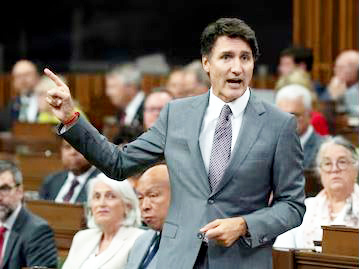Trudeau’s economic policies have drawn criticism for driving Canada further into debt.
Panaji, Goa: Canadian Prime Minister Justin Trudeau has faced increasing scrutiny in recent years, and questions have surfaced regarding his long-term impact on Canada. From controversial policies and strained international relations to economic challenges and domestic criticisms, Trudeau’s leadership is seen by many as increasingly problematic, with some suggesting he has become a liability to Canada and its future. Here’s an analysis of the key areas that fuel this sentiment.
Under Trudeau, Canada’s international standing has taken a hit. Most recently, tensions with India have escalated dramatically after Trudeau alleged that Indian government agents were potentially involved in the assassination of Hardeep Singh Nijjar, a Canadian citizen and Sikh separatist leader. This accusation led to a diplomatic standoff, with India suspending visas for Canadians and withdrawing Canadian diplomats. The fallout has threatened to impact the economic and security relationship between the two nations, which could have far-reaching consequences for Canadian businesses and the large Indian diaspora in Canada.
Trudeau’s relationship with China has also been fraught, especially after Canada detained Huawei executive Meng Wanzhou in 2018 at the request of the United States. China responded by arresting two Canadian citizens, sparking a diplomatic crisis. Despite securing their release, the overall strain has left Canada-China relations in a state of disrepair, affecting trade, technology, and diplomacy.
Moreover, Canada’s relationship with the US, its largest trading partner, has not been without its bumps. While the Trudeau administration has managed to keep relations with the Biden administration friendly, Canada remains economically vulnerable to US policy shifts, from trade tariffs to energy agreements. This vulnerability has heightened concerns that Trudeau’s policies do not adequately protect Canada’s interests in an increasingly volatile global landscape.
Trudeau’s economic policies have drawn criticism for driving Canada further into debt. His government has pursued aggressive spending on social programs, housing, and environmental policies, with many questioning the sustainability of this approach. Canada’s national debt has risen to unprecedented levels, surpassing $1 trillion in 2020 amid pandemic spending, and has continued to grow with inflation-linked pressures and additional spending on climate initiatives. Critics argue that this debt places a heavy burden on future generations and constrains Canada’s ability to address pressing issues, such as affordable housing and healthcare reform.
Inflation and the cost of living have surged under Trudeau, impacting middle-class Canadians and small businesses. Housing affordability, in particular, has become a crisis. Despite promises to address this issue, home prices remain out of reach for many Canadians, with Vancouver and Toronto being among the world’s least affordable housing markets. This disconnect between policy promises and tangible results has raised concerns about Trudeau’s ability to address the real issues Canadians face daily.
Trudeau’s environmental policies have been another point of contention. While his government has committed to ambitious climate targets, the implementation has been inconsistent. His carbon tax policy, which aims to reduce greenhouse gas emissions, has faced resistance, especially in provinces heavily dependent on the energy sector. Critics argue that the policy has disproportionately burdened the middle class and low-income households, as energy costs continue to rise. Furthermore, Trudeau’s recent comments about phasing out fossil fuels have generated anxiety in the oil-rich regions of Alberta and Saskatchewan, where the energy sector is a key economic driver.
Canada’s energy sector remains a significant part of the economy, and Trudeau’s policies appear at odds with its needs. The failure to build pipeline infrastructure, coupled with policies that discourage investment in the oil and gas sector, has hindered Canada’s potential as a global energy player. This approach not only impacts domestic jobs but also limits Canada’s ability to contribute to global energy stability at a time of fluctuating oil markets and geopolitical tensions.
Under Trudeau, Canada has seen growing ideological and political polarisation. From controversial handling of Indigenous issues to support for progressive policies that some view as extreme, Trudeau has been accused of prioritising ideology over unity. His approach to issues like gender identity, inclusivity mandates, and Indigenous reconciliation, while progressive, has often drawn criticism
In 2022, the “Freedom Convoy” protests—an anti-mandate demonstration by truckers—brought to light the growing discontent among Canadians who felt ignored or misunderstood by Trudeau’s government. His response, which included invoking the Emergencies Act, was widely criticised as heavy-handed and alienating. This incident illustrated the divide between urban and rural Canada and raised questions about Trudeau’s ability to bridge the gap between differing Canadian perspectives.
Trudeau’s leadership style has been a point of critique, with critics labelling him as more style than substance. While he has promoted a public image of inclusivity, diversity, and progressiveness, his actions have often been seen as inconsistent with these values. Ethical controversies, including the SNC-Lavalin scandal and the WE Charity scandal, have eroded public trust. These controversies paint a picture of a leader who, despite public declarations of transparency and accountability, may prioritise political survival over ethical governance.
With Canada at a crossroads—facing global economic challenges, domestic divisions, and a complex international landscape—the question remains: Is Trudeau the leader Canada needs for its future? While his supporters argue that he has brought Canada onto the world stage with a progressive vision, his critics contend that his policies have left the country economically vulnerable, diplomatically isolated, and ideologically divided.
As Canada prepares for elections next year, Canadians must ask themselves whether Trudeau’s leadership aligns with the country’s long-term interests. The challenges of today demand not only bold vision but also practical solutions that prioritise the welfare of all Canadians over ideological divides.
* Savio Rodrigues is the founder and editor-in-chief of Goa Chronicle.

